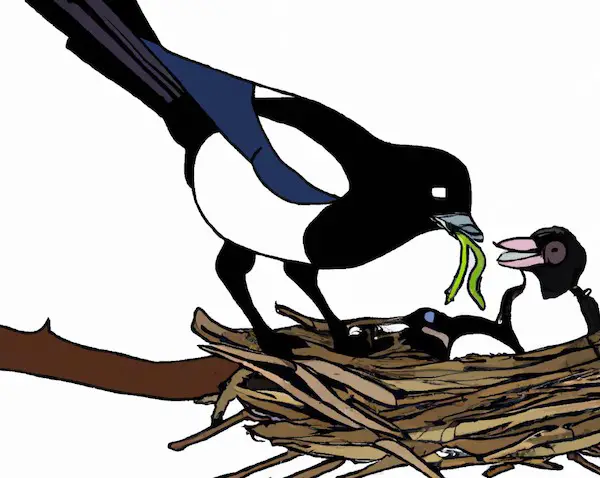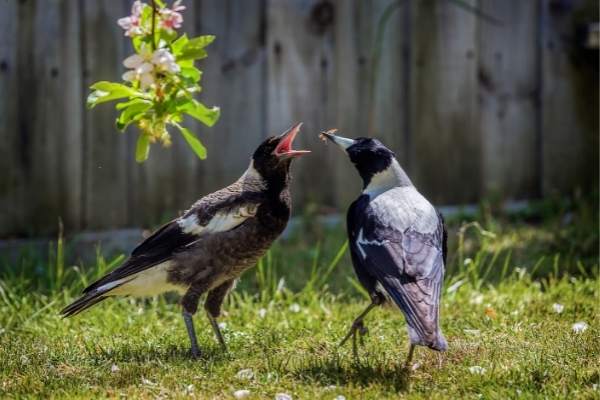Magpies, like other birds of the Corvid family (including crows and ravens), are omnivores and eat a variety of food items. This includes their babies, that mostly eat insects in their first weeks of life.
Adult magpies feed on a broad diet of smaller animals, eggs, seeds, and carrion and they will even attack larger animals like mice or other birds for their flesh. Baby magpies eat softer foods and are mostly fed smaller insects or worms, by their parents.
Magpie is a bird infamously known for its thievery, stealing shiny objects from anywhere it can find. In North America the main breed is the Black-billed magpie (also known as the American magpie) and in Europe the most common magpie is the Eurasian Magpie, which has the same feeding habit.
If you see a magpie at your bird feeder, you will most likely see it eating the more energy-dense foods such as suet, larger seeds, and nuts.
They usually don’t bother too much with the smaller seeds but will gladly eat sunflower seeds and peanuts.
These foods have more protein and fat, which makes them more valuable to the magpies.
Especially nestling magpies have a high need for energy and protein rich foods, but adult magpies also feed on more fat and protein than most other species.
This is because magpies are intelligent and fairly large birds that need energy for their brains and high energy expenditure. This is especially true when they are growing.
Their high intellect allows them to obtain the more energy-rich food items as they recognize them more easily and are able to outsmart other birds (and humans!) to get them.
Contents
What Do Baby Magpies Eat and Drink?
Magpies are omnivores, meaning they eat both plants and animals, but insects are the best source of food for baby magpies.
Magpie babies are usually cared for by both parents in the first part of life. They feed them and watch over them until they leave the nest and can fly on their own.
As is also common for other birds, the parent magpies feed the nestlings mostly insects as they have a lot of protein that the nestling magpie needs to grow.

After leaving the nest juvenile magpies still depend on their parents for nourishing them until they can find food themselves. Their parents will even travel for long distances to find food for the babies, but mostly the fledgelings stay nearby.
The mother or father bird will first crush harder food items before feeding them to the baby. This is done to make sure that the food becomes soft enough for them to digest easily.
The baby magpies get most of their water through the food they eat as their mother cannot carry water for them. In addition, they may also drink a few droplets when it rains.
What to feed abandoned baby magpies
If you find an abandoned baby magpie, it is not generally recommended to take it in and feed it. Instead, try to locate its parents and bring the baby bird into their sight.
If you’re not successful in reuniting parents with their nestling child, you can feed the nestling of fledgling magpie yourself.
If very young, you can try and squash some worms and carefully put them into the mouth of the bird using cotton tips. You may also soak the cotton tip in water if you suspect the magpie is thirsty.
If the bird is a bit older, you may just present worms or other smaller insects to it and it will likely eat by itself.
What Do Baby Magpies Eat in the Wild?
After leaving their nest, it is now time for the magpie fledglings to find food for themselves.
It takes about 18 days or so before the magpie babies can leave their nest as fledglings, where the parents will continue to feed them for a while.

They are still young and cannot fend off predators, so they depend on their parents to protect them.
When they are in the wild they will feed on soft insects like crickets, ants, and worms. They behave mostly as carnivores and will prefer these as they are high in proteins.
Young birds require more protein than adults as proteins are needed for their growth.
They also need energy for growth and development and they will also feed on small grains like oats, barley, and corn. But best of all is a source of fat from suet, nuts or birds eggs if available.
They also feed on berries and other fruits that are available in the wild. The fruits are sources of many vitamins which give them immunity and strength.
Do magpies eat pigeons?
While magpies are unlikely to attack healthy adult pigeons, they do sometimes attack and eat dying or weak individuals.
Magpies know that animal protein is the best source of nutrients they can get, so they do not shy away from attacking other animals including birds.

Pigeons are large meaty birds that, if possible, magpies will gladly consume for their meat. However, they do not normally attack pigeons unless they show signs of weakness or offense.
What Do Magpies Eat in Summer?
Magpies are usually seen in groups during summer, and they feed on worms that are hidden under the soil. They also eat small rodents like mice, lizards, frogs and other insects that are available to them.
There is abundant availability of food during summer so magpies are eating a lot and are often seen actively searching for food. They are rather busy doing this rather than resting, unlike during winter when they rest in trees or bushes.
The reason why there is plenty of food during summer is that many plants produce fruits during summer and lots of insects are around.
These fruits attract many animals that the magpies can prey upon, and this helps them survive better during this season.
Also, the soil is also warmer during summer due to the heat, and this makes it easier for worms to come closer to the surface of the ground.
Because other birds and animals are abundant during summer and magpies may steal the eggs and nestlings of other birds during spring and early summer.

Cereal like wheat, barley, and oats are also available during late summer and fall. They eat them at the drying/ripe stage as it is the most nutritive stage of cereals.
What Are Magpies Eating in my Lawn?
If you see magpies in your lawn, it is likely that they are feeding on insects. Magpies are omnivores, meaning they eat plants and meat, but they prefer the high protein and fat content of animals.
Therefore it is highly possible that the magpies are feasting on insects in your lawn.
They may also be eating smaller animals like frogs or mice. Magpies are hunters and they will prey on anything that comes in their way. If the insects are not available, then they may eat small animals, and even other birds, as an alternative.

They also eat grass seeds as a source of energy, and sometimes even the grass itself. Grass helps in producing chyme, which is a mix of food and digestive juices. It also acts as ballast on the intestines, helping them digest foods better.
Do Magpies Eat Ants?
Yes, magpies do eat ants. Ants are an important source of proteins for magpies. They will eat them as they contain lean meat.
Ants are healthy for magpies and they will eat them whenever the opportunity arises.
When eating them they make sure that the ants do not climb on their bodies. They will eat them at a faster rate so that ants do not have enough time to crawl on their bodies.
Do Magpies Eat Worms?
Yes, magpies do eat worms. Magpies mainly feed on insects in lawns and in fields. During winter when there is a scarcity of insects they may resort to eating worms.
They search for worms in the soil and eat them when they sense their presence. They make a quick swoop on the worms and will try to catch them before they burrow into the soil again.
Do Magpies Eat Mice?
Yes! Adult magpies are known to hunt for and eat smaller rodents like mice. If other food items are scarce, they will group together to attack common species of mice like the house mouse or field mouse.
If they find a mouse nest, they will also eat baby mice without hesitation. However, mice nests are usually not accessible to magpies.
Juvenile magpies are usually not fast and experienced enough to hunt and catch mice, however, they may eat a mouse that is found dead e.g. run over by a car, and easy to access without too much competition from other scavengers!
Conclusion
Magpies are omnivores, meaning they eat plants and meat. Therefore it is highly possible that the magpies are feasting on insects in your lawn.
They may also be eating other smaller animals like slugs, frogs, or mice. Magpies are hunters and they will prey on anything that comes in their way.
If the insects are not available, then they eat seeds and nuts as an alternative.
They rarely eat plants, but some grass helps provide fibers, which acts as ballast on intestines helping them digest foods better.
If you are annoyed by magpies in your yard, check out which birds they might scare away and how some techniques to keep pests away will also work for magpies!
Backyard birds in the United States
Are you interested in how the backyard birds in your state compare to other states?
Then check out my other blog posts below:
- Backyard birds of Alabama
- Backyard birds of Colorado
- Backyard birds of Delaware
- Backyard birds of Georgia
- Backyard birds of Hawaii
- Backyard birds of Illinois
- Backyard birds of Iowa
- Backyard birds of Kentucky
- Backyard birds of Louisiana
- Backyard birds of Maryland
- Backyard birds of Massachusetts
- Backyard birds of Missouri
- Backyard birds of Nebraska
- Backyard birds of New York
- Backyard birds of North Carolina
- Backyard birds of Oklahoma
- Backyard birds of Rhode Island
- Backyard birds of South Carolina
- Backyard birds of Tennessee
- Backyard birds of Texas
- Backyard birds of Virginia
- Backyard birds of West Virginia
- Backyard birds of Wisconsin
- Backyard birds of Wyoming
Or in Canada:
- Backyard birds of Ontario
- Backyard birds of Prince Edward Island
- Backyard birds of Saskatchewan
- Backyard birds of Quebec
Not on the list – check out the rest of my posts on backyard birds here!
Maybe you would like to know if the Blue Jay or Cardinal dominates in the bird feeder hierarchy or how birds such as seagulls sleep at night? Or why mourning doves poop so much.
If you are interested in posters and other wall arts etc. with drawings of all the backyard birds you have just read about, check out my portfolio over at Redbubble:
References
American Museum of Natural History Birds of North America. DK; Revised edition (September 6, 2016). ISBN: 978-1465443991
National Geographic Backyard Guide to the Birds of North America, 2nd Edition. National Geographic; 2nd edition (October 15, 2019)
Birds of North America. National Audubon Society. (Knopf April 6, 2021). ISBN: 978-0525655671




